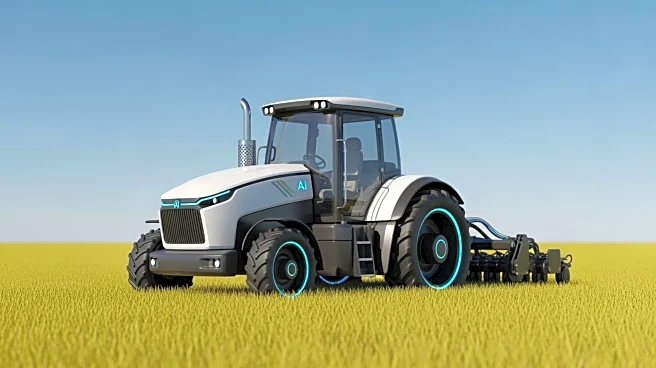What's Happening?
The agricultural equipment market is projected to reach USD 301.81 billion by 2031, driven by the integration of artificial intelligence (AI) and automation technologies. These advancements are enhancing precision, efficiency, and scalability within the sector.
AI-powered analytics and predictive modeling are enabling companies to optimize operations, reduce waste, and anticipate market trends. Automation is streamlining repetitive processes, minimizing human error, and accelerating production timelines. The market is experiencing significant growth, reflecting a shift towards data-driven and sustainable agricultural practices. This transformation is supported by advancements in AI, GPS, and robotics, leading to increased adoption of precision farming techniques.
Why It's Important?
The integration of AI into agricultural equipment is revolutionizing the industry by enabling machinery to perform complex tasks autonomously, such as soil analysis, targeted pesticide application, and crop monitoring. This shift addresses challenges like labor shortages and environmental concerns, promoting sustainable agricultural practices. However, the widespread adoption of AI presents challenges, including a global semiconductor shortage that impacts the availability and affordability of smart agricultural machinery. Additionally, integrating AI technologies requires substantial investment in infrastructure and training, posing barriers for small-scale farmers. Addressing these challenges is crucial for ensuring equitable access to AI-driven agricultural advancements.
What's Next?
The agricultural equipment market is expected to continue its growth trajectory, with projections indicating a substantial increase in market size by 2034. Key players in the industry are likely to focus on investment strategies, marketing strategies, and product development plans to capitalize on this growth. The competitive landscape will see shifts in management and strategies as companies aim to accelerate market growth. Addressing supply chain disruptions and ensuring equitable access to AI-enabled equipment will be critical for maintaining momentum in the sector.
Beyond the Headlines
The integration of AI in agriculture not only enhances operational efficiency but also raises ethical and cultural considerations. The reliance on technology may alter traditional farming practices and impact rural communities. Ensuring that AI-driven advancements are accessible to all farmers, regardless of scale, is essential for promoting inclusivity and sustainability in agriculture. Additionally, the environmental benefits of precision farming techniques could contribute to broader efforts to combat climate change.
















